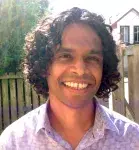
Digital creators sharing unique elements of their culture or language on platforms such as TikTok comes with risk, according to a Kwantlen Polytechnic University (KPU) scholar.
“A platform like TikTok allows users to easily share what is important to them. In this way, social media enables knowledge-sharing and relationship-building. At the same time, social media extends existing problems when it comes to cross-cultural engagement,” says Dr. Kris Singh, an English instructor at KPU.
In the newly-published article, “I know the world by how I speak the world: TikTok ABCs, Disaster Language, and Andrew Salkey’s Hurricane,” Singh demonstrates how the use of Caribbean vernacular on social media is frequently linked with humour, resulting in serious posts being misinterpreted as funny.
“The West has often caricatured Caribbean ways of speaking in their music and movies, and within the Caribbean, working-class and rural ways of speaking can easily become the butt of the joke. If caricatures become dominant on social media, then those who use these languages are at risk of further marginalization.”
Published in Archipelagos, a peer-reviewed, open access journal of Caribbean digital praxis, Singh’s article argues the use of vernacular in social media risks decontextualization, distortion, and willful misinterpretation. Audiences have been primed, Singh says, to hear Caribbean vernacular as funny or without political consequence.
Singh points us to Trinidadian digital creator Stephon Felmine as an example. His unconventional approach to teaching the ABC’s and 123’s in Trinidadian English have earned him six-figure likes. Taking the persona of a teacher, Felmine uses examples not normally heard in a classroom.
“No teacher would ever teach the ABC’s using these words. That’s the joke. There’s a sort of ironic humour at play, and by getting the joke, that’s how identity is consolidated,” says Singh.
Singh contrasts Felmine’s popular skits with a survivor’s testimony of a volcano eruption in St. Vincent. Since serious reflections from the survivor are interpreted as humour on social media, Singh argues that the “funniness” attached to Caribbean vernacular risks compromising the opportunities for ideological inspection that fictional and non-fictional representations of disaster make possible.
“Users of Caribbean vernacular are less likely to be seen as emotionally and psychologically complex and are more likely to be pushed out of political discourse. This means that during times of disaster their needs are less likely to be met and their testimonies are received as entertaining.”
Social media has granted us access to different spaces around the world that we never had access to before, allowing us to learn about different cultures and hear how other people speak. But the Caribbean example reminds us that social media platforms are powerful entities that allow our content creation.
“A lot of people might not really think about how these corporations inform our engagement with each other or make us express ourselves in certain ways to draw an audience. This is informing how we present ourselves to each other,” he says.
At the same time, Singh remains interested in how users innovate and empower themselves within these circumstances.
“The danger is either forgetting the profit-driven nature of social media platforms or giving into passivity in the face of these facts.”